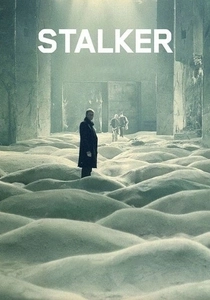Soviet cinema has often explored themes of isolation and solitude, reflecting the complexities of human emotions within the context of a society that valued collectivism. This curated list of ten Soviet films delves into the theme of loneliness, showcasing how characters navigate through their personal struggles, often against the backdrop of a vast and sometimes oppressive landscape. These films provide not only a window into the Soviet era's cultural and psychological landscape but also offer universal insights into the human condition, making them valuable for viewers seeking to understand the nuances of loneliness.

Stalker (1979)
Description: A journey into the Zone, where three men confront their deepest desires and fears, highlighting the profound loneliness of human existence.
Fact: The film was shot in Estonia, and the Zone was created using abandoned factories and industrial sites.
 Watch Now
Watch Now

The Irony of Fate (1975)
Description: This New Year's Eve comedy-drama explores the loneliness of a man who, due to a mix-up, ends up in the wrong city and apartment, reflecting on his life's choices and solitude.
Fact: The film is traditionally shown on Russian TV every New Year's Eve, becoming a cultural phenomenon.
 30 Days Free
30 Days Free

The Mirror (1975)
Description: Andrei Tarkovsky's semi-autobiographical film delves into themes of memory, time, and personal isolation through a series of dream-like sequences.
Fact: Tarkovsky's mother, Maria Vishnyakova, plays the role of his own mother in the film.
 30 Days Free
30 Days Free

The Ascent (1977)
Description: Set during WWII, this film portrays the harrowing journey of two partisans, emphasizing the spiritual and physical isolation of war.
Fact: Larisa Shepitko, the director, died in a car accident shortly after the film's completion.
 30 Days Free
30 Days Free

The Cranes Are Flying (1957)
Description: A poignant tale of love and loss during WWII, where the protagonist experiences profound loneliness after her lover goes missing.
Fact: The film won the Palme d'Or at the Cannes Film Festival in
 30 Days Free
30 Days Free

The Ballad of a Soldier (1959)
Description: A young soldier's brief journey home during WWII reveals the loneliness of war and the longing for connection.
Fact: The film was inspired by the director's own experiences during the war.
 30 Days Free
30 Days Free

The Commissar (1967)
Description: A pregnant commissar is forced to stay with a Jewish family, leading to a deep exploration of isolation and human connection.
Fact: The film was banned in the Soviet Union for 20 years due to its depiction of Jewish life.
 30 Days Free
30 Days Free

The Thief (1997)
Description: Set in post-war Soviet Union, the film follows a young boy and his mother as they navigate life with a charismatic but morally ambiguous man, highlighting themes of emotional isolation.
Fact: The film was Russia's submission for the Academy Award for Best Foreign Language Film in
 30 Days Free
30 Days Free

The Return (2003)
Description: Two brothers embark on a mysterious journey with their long-lost father, exploring themes of isolation, identity, and familial bonds.
Fact: The film won the Golden Lion at the Venice Film Festival in
 30 Days Free
30 Days Free

The Stationmaster (1972)
Description: Based on a Pushkin story, this film examines the life of a stationmaster whose daughter leaves him, leaving him in profound loneliness.
Fact: The film was part of a series of adaptations of Pushkin's works by director Sergei Solovyov.
 30 Days Free
30 Days Free









